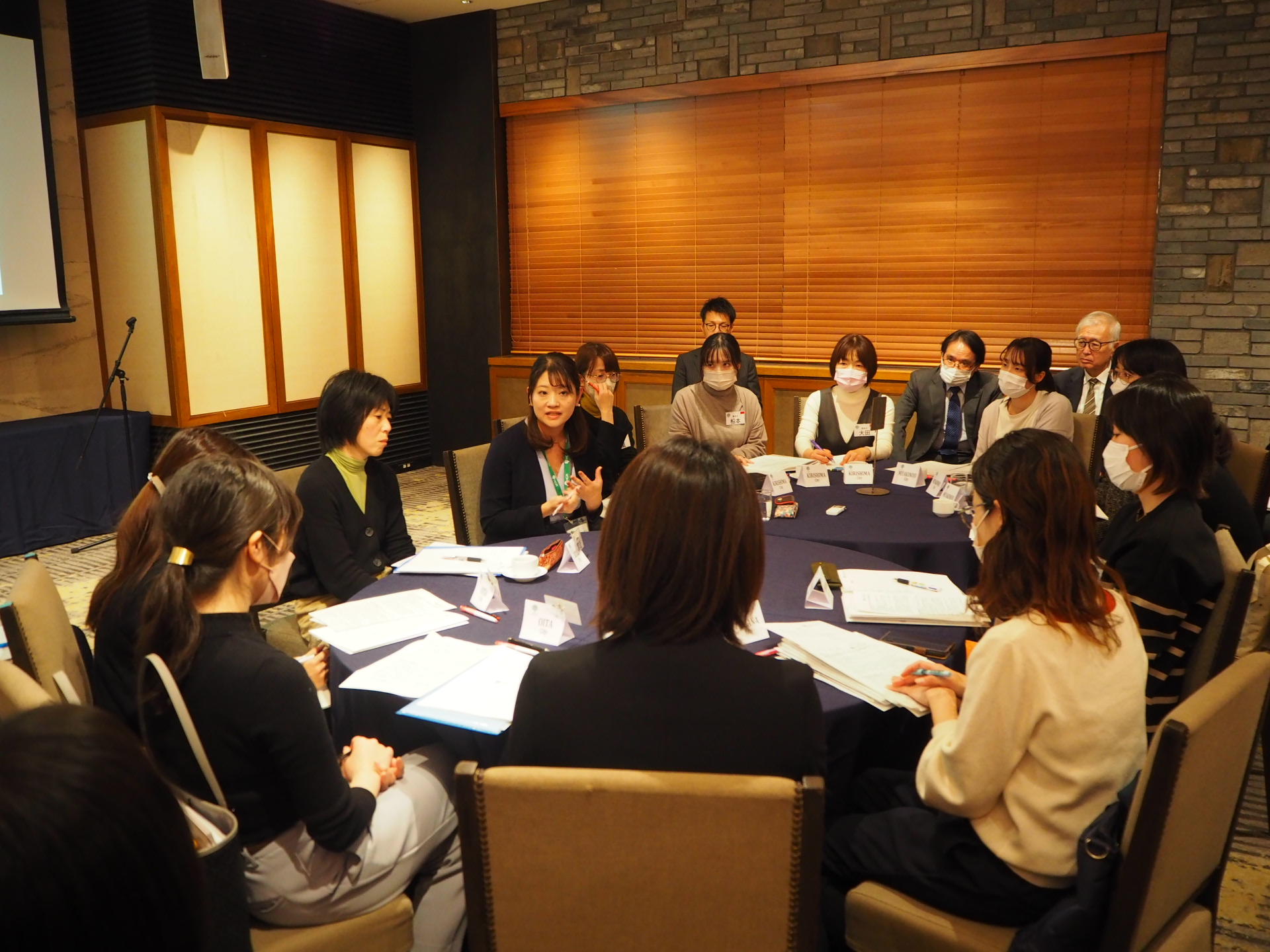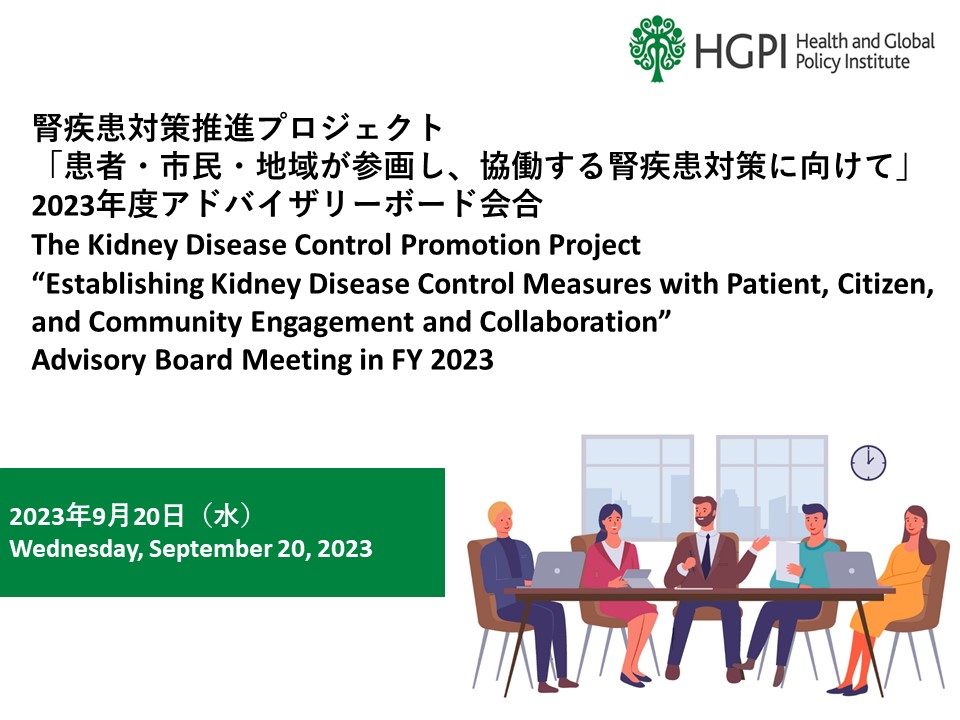[Policy Recommendations] Kidney Disease Control Promotion Project 2023 “Establishing Kidney Disease Control Measures with Patient, Citizen, and Community Engagement and Collaboration” Policy Recommendations, a Collection of Good Practices of Chronic Kidney Disease (CKD) and Control Measures in Local Governments (February 14, 2024)
date : 3/8/2024
Tags: Kidney Disease, NCDs
![[Policy Recommendations] Kidney Disease Control Promotion Project 2023 “Establishing Kidney Disease Control Measures with Patient, Citizen, and Community Engagement and Collaboration” Policy Recommendations, a Collection of Good Practices of Chronic Kidney Disease (CKD) and Control Measures in Local Governments (February 14, 2024)](https://hgpi.org/en/wp-content/uploads/sites/2/b6bfd5b0ab245a6ba1c6d97213264fa5.jpg)
The English version of the file has been published. (March 08, 2024)
The Health and Global Policy Institute (HGPI) Project for the Kidney Disease Control Promotion has presented policy recommendations and a collection of good practices entitled “Kidney Disease Control Promotion Project 2023 ‘Establishing Kidney Disease Control Measures with Patient, Citizen, and Community Engagement and Collaboration’ Policy Recommendations, a Collection of Good Practices for Chronic Kidney Disease (CKD) and Control Measures by Local Governments” in preparation for World Kidney Day 2024 (March 14).
Based on the contents of the 2022 Urgent Recommendations , the Kidney Disease Control Promotion Project aimed to further deepen the discussion on the control of CKD by strengthening cooperation with related academics, medical professionals, and patient groups.
Although some good examples have emerged and are being developed by the local governments responsible for implementation, many are still at the exploratory stage, and it is difficult to say that concrete and effective CKD control is happening throughout the country. Therefore, HGPI conducted interviews between August to September of 2023 with local governments throughout Japan that have set good examples of CKD control to investigate the background and process behind successful promotion of CKD control. The interviews also aimed to hear about the lessons learned to date and understand the needs of local governments in order to further improve CKD control measures in the future. Interviews were conducted with 8 local governments and 4 experts.
On September 20, 2023, HGPI held an advisory board meeting consisting of experts in the kidney disease field from industry, government, academia, and the private sector to discuss possible solutions to these health issues and how experts can contribute to the implementation of community-based CKD control (such as early detection, diagnosis, and prevention of severe disease).
Six recommendations were compiled based on the issues discussed during the interviews on good CKD practices by local governments and the advisory board meeting.
■Recommendations
- Recommendation 1: In order to detect more individuals with suspected CKD at an early stage, the CKD screening in health checkups and CKD control by insurers should be further strengthened while also aiming to improve the health checkup uptake rate.
- Recommendation 2: To ensure that individuals with suspected CKD are referred to medical institutions for consultation and treatment based on the results of health checkups, the methods of recommending consultation and the explanation of results should be improved. Awareness of CKD should be raised through public awareness-raising activities.
- Recommendation 3: To ensure that CKD patients who visit a medical institution after a health checkup are continuously provided with appropriate medical intervention and guidance to improve their diet and lifestyle accordingly, it is important to raise awareness of the disease among family doctors, disseminate medical guidelines and referral criteria, introduce evaluations according to the CKD stage, and provide incentives for treatment. In addition, measures to eliminate the shortage and maldistribution of nephrologists should be taken.
- Recommendation 4: At core hospitals and base medical institutions, comprehensive treatment should be realized through collaboration among nephrologists, diabetologists, and specialists in other medical departments. A system for early detection of CKD in patients receiving treatment at other medical departments should also be considered.
- Recommendation 5: In order to promote CKD control in local communities, comprehensive lifestyle-related disease control from a cross-disease perspective should be promoted by physicians, nurses, pharmacists, dietitians, public health nurses, and other professionals. A multidisciplinary cooperation system including local governments and the patient community should be established.
- Recommendation 6: The roles of prefectures and municipalities should be clarified, and each municipality should promote CKD control alongside measures against other lifestyle-related diseases such as diabetes. A PDCA (Plan Do Check Action) cycle of CKD measures should be implemented.
We hope that our recommendations will help policy makers and stakeholders make policy progress toward kidney disease control with the participation and collaboration of patients, citizens, and communities.
For more details, please see the PDF file at the end of this document.
■Municipalities and experts who cooperated in the interviews (titles omitted, in alphabetical order by prefecture and city, affiliation and title at the time of participation)
Gifu Prefecture
Chiba Prefecture
Nagasaki Prefecture
Yamanashi Prefecture
Okayama City, Okayama
Kumamoto City, Kumamoto
Takasaki City, Gunma
Asahi City, Chiba Prefecture: Kensuke Yoshimura (Head and Specially-Appointed Professor, Center for Next Generation of Community Health, Chiba University Hospital / Representative, COV-Navi), Hidekazu Iida (Specially-Appointed Lecturer, Center for Next Generation of Community Health, Chiba University Hospital)
Minato Ward, Tokyo: Akira Fukui (Lecturer, Division of Nephrology and Hypertension, Department of Internal Medicine, The Jikei University School of Medicine)
Nagasaki City, Nagasaki Prefecture
Matsumoto City, Nagano: Kamijo Yuji (Clinical professor, Shinshu University Hospital, Department of Nephrology)
Sado City, Niigata Prefecture: Tominaga Yoshiko (Professor, Department of Pharmacy, Niigata University of Pharmacy and Applied Life Sciences)
■Advisory board members (title omitted; in Japanese syllabary order)
Yuuichi Ishikawa (Professor, Department of Food Sciences, College of Life Sciences, Ibaraki Christian University)
Kojiro Ueki (Director, Diabetes Research Center, National Center for Global Health and Medicine (NCGM))
Akiko Uchida (Chief nurse, Seirei Sakura Citizen Hospital)
Naoki Kashihara (Chairman, Japan Kidney Association / Director and Specially-Appointed Professor, Kawasaki Geriatric Medical Center)
Iwao Kurose (Executive Director, Japan Medical Association)
Takeshi Shukunobe (President and CEO, PPeCC; Power to the People with Chronic Conditions)
Koichi Tamura (Head, Department of Medical Science and Cardiorenal Medicine, Graduate School of Medicine, Yokohama City University)
Akira Fukui (Lecturer, Division of Nephrology and Hypertension, Department of Internal Medicine, The Jikei University School of Medicine)
Masashi Mukoyama (Professor, Department of Nephrology, Faculty of Life Sciences, Kumamoto University)
Toshiki Moriyama (Professor, Health and Counselling Center, Osaka University)
Kensuke Yoshimura (Head and Specially-Appointed Professor, Center for Next Generation of Community Health, Chiba University Hospital / Representative, COV-Navi)
Top Research & Recommendations Posts
- [Policy Recommendations] The Path to a Sustainable Healthcare System: Three Key Objectives for Public Deliberation (January 22, 2026)
- [Research Report] Perceptions, Knowledge, Actions and Perspectives of Healthcare Organizations in Japan in Relation to Climate Change and Health: A Cross-Sectional Study (November 13, 2025)
- [Research Report] The 2025 Public Opinion Survey on Healthcare in Japan (March 17, 2025)
- [Policy Recommendations] Reshaping Japan’s Immunization Policy for Life Course Coverage and Vaccine Equity: Challenges and Prospects for an Era of Prevention and Health Promotion (April 25, 2025)
- [Research Report] The 2023 Public Opinion Survey on Satisfaction in Healthcare in Japan and Healthcare Applications of Generative AI (January 11, 2024)
- [Research Report] AMR Policy Update #4: Cancer Care and AMR (Part 1)
- [Policy Recommendations] Developing a National Health and Climate Strategy for Japan (June 26, 2024)
- [Public Comment Submission] “Assessment Report on Climate Change Impacts in Japan (Draft Overview)” (December 24, 2025)
- [Research Report] Survey of Japanese Physicians Regarding Climate Change and Health (December 3, 2023)
- [Research Report] The Public Opinion Survey on Child-Rearing in Modern Japan (Final Report) (March 4, 2022)
Featured Posts
-
2026-01-09
[Registration Open] (Hybrid Format) Dementia Project FY2025 Initiative Concluding Symposium “The Future of Dementia Policy Surrounding Families and Others Who Care for People with Dementia” (March 9, 2026)
![[Registration Open] (Hybrid Format) Dementia Project FY2025 Initiative Concluding Symposium “The Future of Dementia Policy Surrounding Families and Others Who Care for People with Dementia” (March 9, 2026)](https://hgpi.org/en/wp-content/uploads/sites/2/dementia-20260309-top.png)
-
2026-02-05
[Registration Open] (Webinar) The 141st HGPI Seminar “Current Status and Future Prospects of Korea’s Obesity Policy: Voices of People with Lived Experience in Policy Promotion” (March 3, 2026)
![[Registration Open] (Webinar) The 141st HGPI Seminar “Current Status and Future Prospects of Korea’s Obesity Policy: Voices of People with Lived Experience in Policy Promotion” (March 3, 2026)](https://hgpi.org/en/wp-content/uploads/sites/2/hs141-top-1.png)
-
2026-02-06
[Research Report] AMR Policy Update #5: Cancer Care and AMR (Part 2)
![[Research Report] AMR Policy Update #5: Cancer Care and AMR (Part 2)](https://hgpi.org/en/wp-content/uploads/sites/2/HGPI_20260204_AMR-Policy-Update-5.png)







